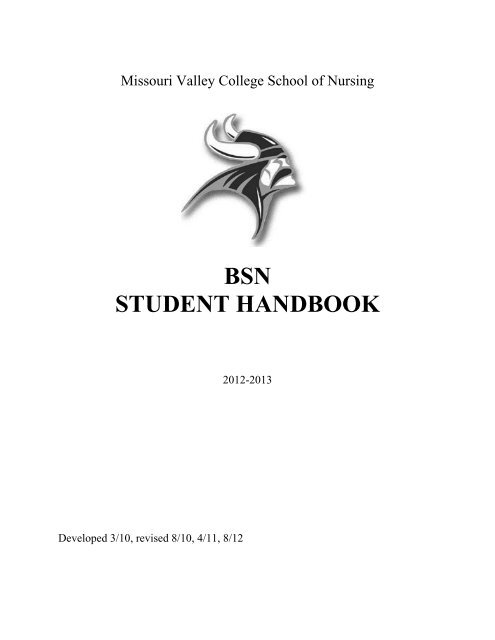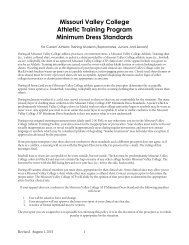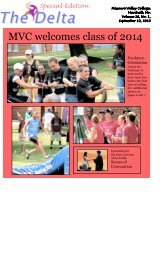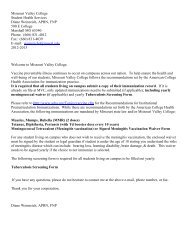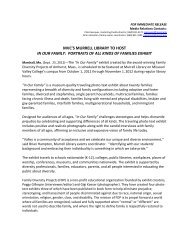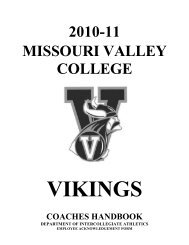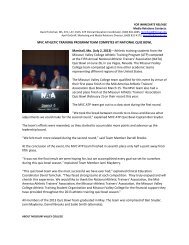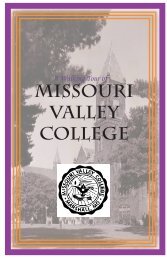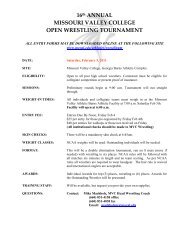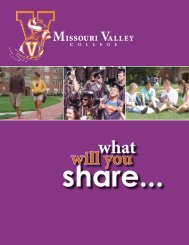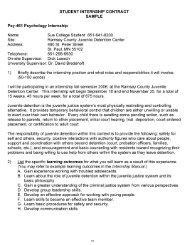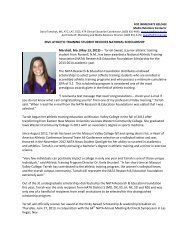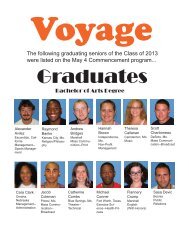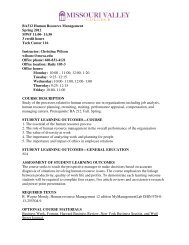BSN STUDENT HANDBOOK - Missouri Valley College
BSN STUDENT HANDBOOK - Missouri Valley College
BSN STUDENT HANDBOOK - Missouri Valley College
You also want an ePaper? Increase the reach of your titles
YUMPU automatically turns print PDFs into web optimized ePapers that Google loves.
TABLE OF CONTENTSResource Persons ……………………………………………. page 1Purpose ……………………………………………………… page 3Section I: Introduction ……………………………………… page 4Mission and Philosophy…………………………. page 4<strong>Missouri</strong> <strong>Valley</strong> <strong>College</strong> ………………….. page 4School of Nursing ………………………… page 5School of Nursing Building ……………………... page 6Section II: Admission and Curriculum Patterns …………….. page 7Student Admission to MVC …………………….. page 7Student Admission to School of Nursing ………. page 7Curriculum Pattern of Nursing Student ………… page 8Functional Abilities ……………………………… page 13Credit by exam (CLEP) ………………………….. page 14Transfer of credit ………………………………… page 15Withdrawal from MVC/Program …………………page 15Graduation ……………………………………….. page 15Terminal Objectives ………………………………page 16Section III: Registration Fees and Financial Aid ……………. page 17Pre-registration ………………………………….. page 17Regular registration ……………………………… page 17Late registration …………………………………. page 18Add/Drop ………………………………………... page 18Academic Fees ………………………………….. page 18Financial Aid ……………………………………. page 18Section IV: Academic Policies ……………………………… page 19Grading Policies …………………………………. page 19Medication Calculation Exam …………………… page 21HESI Exam ………………………………………. page 22HESI Specialty Exams …………………….. page 22HESI Mid-curricular Exam ……………….. page 22HESI Exit Exam …………………………… page 23Mandatory Remediation …………………… page 23Course repeat policy …………………………….. page 24Grading scale ……………………………………. page 24
Student academic files ……………………………page 45Nursing student lounge ………………………….. page 45Copying services ………………………………… page 45Bulletin boards ………………………………….. page 46MVC Bookstore ………………………………… page 46Faculty …………………………………………… page 46Bicycle parking ………………………………….. page 47Section IX: Student Organizations ………………………….. page 47SNA ……………………………………………… page 48STT ……………………………………………… page 48Student representation on Faculty Forum ………. page 49References …………………………………………………… page 50Appendix A: Handbook Acknowledgement form ………….. page 51Special Request form ………………….……………….. SON website
RESOURCE PERSONSThe following resource persons are available to assist you. Please feel free to call for assistance.Tonya Eddy, PhDc, RNAcademic and Professional TitleDirector of Nursing EducationAssistant Professor, School of Nursing and Health SciencesEducationA.D.N. State Fair Community <strong>College</strong>B.S.N University of <strong>Missouri</strong>M.S.N. University of <strong>Missouri</strong>Ph.D. (In progress) University of <strong>Missouri</strong>Contact InformationNursing & Health Sciences Building 109 (Fitzgibbon Campus)Off: 660-831-0892Fax: 660-831-0975E-mail: eddyt@moval.eduKarla M. Bruntzel, PhD, LAT, ATCAcademic and Professional TitleDean, School of Nursing and Health SciencesDirector, Athletic Training Education ProgramAssociate Professor, School of Nursing and Health SciencesEducationB.S., University of Nebraska-LincolnM.A., University of DenverPh.D., University of Leeds, UKContact InformationNursing & Health Sciences Building 110 (Fitzgibbon Campus)Off: 660-831-0895Fax: 660-831-0975E-mail: bruntzelk@moval.eduTeresa Taylor, MSN, RNAcademic and Professional TitleClinical Director, NursingAssistant Professor, School of Nursing and Health SciencesEducationB.S.N. Central Methodist UniversityM.S.N., University of PhoenixContact InformationNursing & Health Sciences Building 104 (Fitzgibbon Campus)Off: 660-831-0832Fax: 660-831-0975Email: taylortd@moval.edu1
Carla Wade, MSN, RNAcademic and Professional TitleSkills Lab Coordinator, NursingAssistant Professor, School of Nursing and Health SciencesEducationB.S.N. Graceland University, IAM.S.N., University of PhoenixContact InformationNursing & Health Sciences Building 103 (Fitzgibbon Campus)Off: 660-831-0832Fax: 660-831-0975Email: wadec@moval.eduNatalie Lavelock, MS(N), RN, IBCLCAcademic and Professional TitleAdjunct Instructor, NursingEducationL.P.N/ A.D.N, North Central Mo. <strong>College</strong>B.S.N, University of <strong>Missouri</strong>M.S.N, University of <strong>Missouri</strong>Contact InformationNursing & Health Sciences Building 103 (Fitzgibbon Campus)Off: 660-831-0832Fax: 660-831-0975Email: lavelockn@moval.eduDoug MacDonald, <strong>BSN</strong>Academic and Professional TitleAdjunctEducationB.S.N. Roberts Wesleyan <strong>College</strong>, School of Nursing, NYM.S.N. (In Progress) University of <strong>Missouri</strong> – Kansas CityContact InformationNursing & Health Sciences Building 105 (Fitzgibbon Campus)Off: 660-831-0832Fax: 660-831-0975Email:Hope Taylor, <strong>BSN</strong>Academic and Professional TitleAdjunctEducationB.S.N. Central Methodist UniversityM.S.N. (In Progress) Walden UniversityContact InformationNursing & Health Sciences Building 105 (Fitzgibbon Campus)Off: 660-831-0832Fax: 660-831-0975Email:2
SECTION I: INTRODUCTIONMISSION and PHILOSOPHY<strong>Missouri</strong> <strong>Valley</strong> <strong>College</strong><strong>Missouri</strong> <strong>Valley</strong> <strong>College</strong> is a private, four-year liberal arts college affiliated with thePresbyterian Church (USA). The beautiful 150-acre campus is in Marshall in west central<strong>Missouri</strong>. Just ten miles north of Interstate 70, the campus is strategically located 80 milesnortheast of Kansas City, MO, and 50 miles northwest of Columbia, MO. Founded in 1889,MVC is a liberal arts college that provides educational, social and cultural experiences in aChristian environment. MVC offers over 30 majors and 7 pre-professional programs, and 12sports and 20 varsity teams. The most popular majors include business and education, and thenewest majors are nursing, graphic design, and hospitality and tourism management, which willbegin in Fall 2009. The liberal arts heritage focuses on scholarship, critical thinking andacademic excellence to prepare students to become members of a responsible citizenry. With anenrollment of approximately 1,400 students, <strong>Missouri</strong> <strong>Valley</strong> <strong>College</strong> is accredited by the HigherLearning Commission, a Commission of the North Central Association of <strong>College</strong>s and Schools.The <strong>College</strong> takes great pride in offering a four-year, highly-personalized education to itsstudents.Our MissionGuiding students to succeed through personal instruction and intellectual inquiry.Our VisionKnown for its dynamic, richly diverse, and friendly educational environment, <strong>Missouri</strong><strong>Valley</strong> <strong>College</strong> offers many opportunities to grow in mind, body, and spirit. Facultymembers are personally and professionally engaged in preparing thoughtful citizens formeaningful lives and careers. Grounded in the liberal arts, undergraduate and graduatestudies empower students to master interdisciplinary skills needed to succeed in aknowledge-based global society. Stewardship of resources will sustain innovativeteaching to stimulate critical thinking, creativity, aesthetic appreciation, and the joys oflifelong learning.Our ValuesCompassionDiversitySocial responsibilityIntegrityAccountability4
Our Goals• Nurture a campus culture to embrace all individuals with compassion, civility, and respect.• Gather a demographically diverse student body embracing differences in ethnicity, gender,culture, economic status, and regional and national origin.• Extend access to higher education to students from all educational backgrounds withsupport to achieve success.• Ensure high academic standards in all baccalaureate, graduate, and professional programs.• Recruit and retain a dedicated, diverse staff and faculty well-educated and current in theirfields.• Focus curricula on developing interdisciplinary analytical and communicative skills,historical and cultural awareness, and critical and creative thinking.• Maintain a safe, healthy campus environment conducive to learning and research based onacademic freedom, innovative teaching, and intellectual inquiry.• Expand opportunities for applying academic learning in real-world settings and studyabroad.• Support extracurricular activities to develop teamwork and leadership in arts, academics,and athletics.• Promote civic engagement through service to the community, special programming for thecommon good, continuing education for career development, and facilities for public gatherings.School of Nursing<strong>Missouri</strong> <strong>Valley</strong> <strong>College</strong> School of Nursing Philosophy and Mission:The Philosophy of the Nursing Education Program is consistent with the mission andgoals of <strong>Missouri</strong> <strong>Valley</strong> <strong>College</strong>. Together, it is recognized that learning is a lifelong processand necessary for continued personal and professional development. <strong>Missouri</strong> <strong>Valley</strong> <strong>College</strong>appreciates that professional nursing is a dynamic discipline composed of a vital balancebetween science and art dedicated to the maintenance and promotion of health in diversepopulations. The mission of the nursing education program is to prepare students for generalistprofessional nursing roles at the baccalaureate level through a combination of didactic education,clinical practice, and research utilization.The faculty is committed to the development of academic excellence, professional integrity,personal accountability, compassion, social responsibility and critical thinking within our students,recognizing the importance of these skills in a professional nursing career. The faculty of the schoolbelieves nursing is a practice discipline that develops a structured body of knowledge. As a practicediscipline, the education of professional nurses focuses on both the theoretical base and the applied5
ase.The Nursing School BuildingThe nursing school is located on the Fitzgibbon Hospital Campus, in the Buckner WellnessCenter building. The facility location was generously donated by Fitzgibbon Hospital. Thecompleted facility was dedicated in October, 2009.The nursing school building provides a functional and comfortable setting for nursingeducation. The entire building is designed to meet the needs of the handicapped and is completelyaccessible. Priority usage for the building is nursing and health sciences education, student andprofessional organization meetings, and conferences.The building houses: classrooms; offices for faculty, administration, and staff; technologyfacilities, and student and faculty lounge areas. Office space is provided for the Nursing Programand the Health Sciences Department.** The Fitzgibbon Hospital campus is a NON-SMOKING campus.Therefore, smoking is not permitted within the MVC-School of Nursing& Health Sciences or any of the surrounding property or parking areas.Smoking must be conducted off the hospital campus. **6
Students not meeting one of the above admission criteria may submit a petition for specialconsideration. Special consideration may be given to students who have demonstrated unusualmotivation toward a nursing career and whose backgrounds demonstrate substantial economic orcultural diversities.Curriculum Pattern for <strong>BSN</strong> Students<strong>Missouri</strong> <strong>Valley</strong> requires that all graduates complete a minimum of 128 hours to obtain aBachelor’s of Science degree. Transfer students must complete a minimum of 30 credit hours inresidence at <strong>Missouri</strong> <strong>Valley</strong> to obtain a degree from <strong>Missouri</strong> <strong>Valley</strong>. The length of the programdepends on whether a student is part-time or full-time and the completion of any courseworkprior to entry into the program. The following is the list of general education and foundationcourse work for nursing students.<strong>Missouri</strong> <strong>Valley</strong> <strong>College</strong> School of NursingTraditional 4-year plan of coursework (cohort 2013 & 14)Students requiring a developmental Math or English upon entry to <strong>Missouri</strong><strong>Valley</strong> should anticipate an additional year of pre-requisite coursework priorto applying to the nursing program.Pre-Nursing (Year 1)Fall SemesterBI 124* ** Human Biology/Lab (Core II – Science) 4EN 130 Rhet and Comp (Core I) 3PY 100* Intro to Psychology (Core III) 3MA 150 or above General Education Math (Core II – Math) 3NU 110* Introduction to Nursing 3GS 150 Freshman Seminar 1___________17 hoursSpring SemesterBI/EX 255* ** Human Anatomy and Physiology 4EN 160 Lit and Comp (Core I) 3MA 200* Statistics (Core II – Math) 3NU 150* Health Assessment 3CH 111* ** General Chemistry I (Core II – Science) 5(or chem. for healthcare – 3 hrs)____________16-18 hours* Denotes pre-requisite for acceptance into the nursing program. These courses must becompleted, or acceptable plan by student to have course completed prior to start date of program.8
Nursing Program (Year 2)Fall SemesterBI 320** Microbiology 4EX 385 Human Nutrition 3SP 100 Public Speaking (Core I) 3PY 225 Developmental Psychology 3NU 270 Pharmacology 3PE 221 Lifetime Wellness (Core VI) 2____________18 hoursSpring SemesterBI 350** Pathophysiology 3HS 104 or 105 History I or History II (Core IV) 3SC 100 Introduction to Sociology (Core III) 3NU 230 Fundamentals of Nursing Practice 3 (1hr lab)(+ 16 hour clinical experience)NU 280 Medication Administration (with IV administration) 2(+ 8 hour clinical experience)NU 210 Culture in Healthcare 1PL 150 Biomedical Ethics (Core IV) 3_____________18 hoursNursing Program (Year 3)Fall SemesterCS 119 Computer Applications (Core II) 3 (On-line option)NU 320 Adult Health Nursing I 3NU 322 Adult Health Nursing Clinical 3NU 410 Nursing Management & Law 3NU 430 Nursing Research I (with Nursing Theory) 3NU 440 Gerontological Nursing 1____________16 hoursSpring SemesterREXXX Religion 3General Education Electives (Core V) 3NU 336 Gender Issues in Nursing 2NU 310 Mental Health Nursing 3NU 312 Mental Health Nursing Clinical 1NU 350 Community and Public Health Nursing 3NU 352 Community and Public Health Nursing Clinical 2______________17 hours9
Nursing Program (Year 4)Fall SemesterGeneral Education Electives (Core V) 3NU 330 Pediatric Nursing 3NU 332 Pediatric Nursing Clinical 2NU 340 Obstetric and Women’s Health Nursing 3NU 342 Obstetric and Women’s Health Nursing Clinical 2NU 420 Professional Collaboration in Nursing Practice 2NU 425 Nursing Informatics 3_____________18 hoursSpring SemesterNU 435 Nursing Research II (Evidence Based Practice) 2NU 450 Adult Health II 3NU 480 Senior Seminar in Nursing 6(1 hr didactic, 1 hr Capstone, 4 hrs Practicum)3-8 hours of Electives:General Education Electives (Core V) 3Other Suggested CoursesPY 305 Grief and Loss 3PY 322 Physiological Psychology 3PY 341 Human Sexuality 3PY 345 Adult Abnormal Psychology 3SC 450 Sociology of Health and Medical Care 3NU 259, 359, 459 Special Topics in Nursing 3AL 358 Therapeutic Exercise 4___________14-17 hoursTraditional 4-year plan of coursework (2016+ cohort)Pre-Nursing (Year 1)Fall SemesterBI 104 €** Biology/Lab (Core III.A #1) 4EN 130 € Rhet and Comp (Core I.A) 3PY 100 € Intro to Psychology (Core III.B) 3MA 150, 165 or above € General Education Math (Core I.B #1) 3NU 110* Introduction to Nursing 3GS 150 Freshman Seminar 1___________17 hoursSpring Semester10
BI 275* ** Human Anatomy and Physiology I 4EN 160 € Lit and Comp (Core I.A) 3SP 100 € Public Speaking (Core I.A) 3MA 200 € Statistics (Core I.B #2) 3CH 109 or 111€ **General Chemistry I (Core III.A #2)5 __________18 hoursPre-nursing (Year 2)Fall SemesterBI 320* ** Microbiology 4BI285* ** Anat & Phys II 4EX 385* ** Human Nutrition 3Multicultural sensitivity (core II.A #1) 3HEXXX* Principles of Pharmacology 2PE 221 Lifetime Wellness (Core II.B) 2__________18 hoursSpring SemesterRE1XX or SC100 Multicultural sensitivity (core II.A #2) 3PY 225* Developmental Psychology 3HU or Fine Arts Creativity Core III.D 3HS104 or 105 History I or II (Core III.C) 3PL110 Critical Thinking (Core II.C) 3PL 150€ Biomedical Ethics (Core II.D) 3_____________18 hoursAll core coursework must be completed prior to admission into program.€ Required course that is also core course.* Denotes non-core pre-requisite for acceptance into the nursing program. These courses must becompleted, or acceptable plan by student to have course completed prior to start date of program. Nomore than one course can be completed in the summer semester after acceptance into the program, andmust be completed prior to start date of first semester in program.Nursing Program (Year 3)Fall SemesterNU 150 Health Assessment 3NU 210 Culture in Healthcare 1NU 230 Fundamentals of Nursing Practice 3 (1hr lab)(+ 16 hour clinical experience)NU 270 Pharmacology for Nurses 3NU 280 Medication Administration (with IV administration) 2(+ 8 hour clinical experience)NU 410 Nursing Management & Law 3____________15 hours11
Spring SemesterBI 350** Pathophysiology 3NU 310 Mental Health Nursing 3NU 312 Mental Health Nursing Clinical 1NU 350 Community and Public Health Nursing 3NU 352 Community and Public Health Nursing Clinical 2(Core II.E, Serv. Learn)NU 420 Professional Collaboration in Nursing Practice 2NU 425 Nursing Informatics 2______________16 hoursNursing Program (Year 4)Fall SemesterNU 320 Adult Health Nursing I 3NU 322 Adult Health Nursing Clinical 3NU 340 Nursing of Families 4NU 342 Obstetric and Women’s Health Nursing Clinical 2NU 430 Nursing Research I (with Nursing Theory) –WI 3NU 440 Gerontological Nursing 1_____________16 hoursSpring SemesterNU 332 Pediatric Nursing Clinical 2(Core II.E, Serv. Learn)NU 435 Nursing Research II (Evidence Based Practice) 2NU 450 Adult Health II 3NU 480 Senior Seminar in Nursing 6(1 hr didactic, 1 hr Capstone, 4 hrs Practicum) _____________13 hoursOther Suggested Courses for students to choose if need additional hours:PY 305 Grief and Loss 3PY 322 Physiological Psychology 3PY 341 Human Sexuality 3PY 345 Adult Abnormal Psychology 3SC 450 Sociology of Health and Medical Care 3NU 259, 359, 459 Special Topics in Nursing 3AL 358 Therapeutic Exercise 4** ALL SCIENCE COURSES WILL BE EVALUATED ON AN INDIVIDUAL BASIS FOR THE TRANSFER OF CREDIT.Clock to credit hour ratio:NU 322 = 60:1 (180 clinical hours = 12 hours/week)All other nursing clinical courses = 50:112
Functional AbilitiesStudents admitted to the <strong>Missouri</strong> <strong>Valley</strong> <strong>College</strong> School of Nursing (MVC-SON)programs are expected to possess the capability to complete the entire nursing curriculum. TheMVC-SON is committed to educating nurses in providing safe, cost-effective patient care.Therefore, the curriculum requires proficiency in a variety of abilities. All students must havethese abilities to fulfill program and course requirements.This policy applies to applicants and current students. If a student has a disability andrequires special accommodation to meet these requirements, the student must provide MVC-SON documentation, through the 504 ADA Coordinator, upon admission to a program of studyor as soon as a need is identified. The MVC-SON will endeavor to make reasonablemodifications and accommodations for students with disabilities, without compromising theperformance standards. Any request for accommodation will be evaluated by faculty incollaboration with the Director and ADA Coordinator as appropriate.The functional abilities include but are not limited to:Physical:1. Possess sufficient energy and mobility to provide patient care to meet courseobjectives.2. Transfer, lift, pull, and perform other demanding physical procedures as required toprovide routine and emergency patient care, while ensuring the safety of self, patient, and others.3. Provide patient care for up to 12 hours; attend clinical experiences at assigned times.4. Utilize sight, hearing, smell, and touch to assess patients at a distance and close athand; effectively use diagnostic instruments and screening tools as required. (Examples includethe use of an otoscope to see landmarks and the eardrum; use of a stethoscope to hear heartsounds; use of hands to palpate, percuss, discriminate sharp and dull, temperature etc.)5. Use gross and fine motor skills while providing patient care, consistent withestablished nursing practice and patient safety. [Examples include maintaining clean/steriletechnique while performing gastrointestinal intubation, urinary catheterization, performingtracheostomy care/changing tracheostomy ties, simple/complex dressing changes, attaching aneedle to a syringe, drawing of medication (from a vial) into a syringe, and giving an injection(manual dexterity involved in holding an extremity while piercing the skin, aspirating, andinjecting.)Cognitive:1. Elicit and interpret verbal and nonverbal communications. (Examples include theability to speak and be understood by others; the ability to interpret facial expressions and bodylanguage.)2. Communicate effectively both verbally and in writing, using appropriate words,grammar, and vocabulary.3. Make accurate decisions in a timely manner, under stressful and challengingconditions. (Examples include prompt response to cardiac monitoring alarms, accuratepatient/situational assessment, and prompt intervention; provide for patient safety, administeroxygen, suction as needed, record seizure activity, and call for help.)4. Utilize analysis, synthesis, critical thinking, and mathematical calculations in theprovision of patient care.13
Interpersonal:1. Interact professionally with individuals, families, and communities of various social,ethnic, and cultural backgrounds.2. Use social skills to form a therapeutic relationship with individuals, families, andcommunities.3. Possess compassion, integrity, motivation, and genuine concern for others.4. Maintain professional behavior and demeanor when faced with challengingsituations.If an applicant is denied admission, or a student is dropped from a program of study dueto the inability to meet a performance standard, the student may request an appeal of thatdecision. The appeals procedure includes:1. The student shall contact the academic advisor for assistance with the appealsprocess.2. The student shall notify, in writing, the appropriate faculty member(s), ProgramDirector, and the ADA Coordinator indicating their initiation of the appeals process.3. The student shall write an appeal to the Faculty Committee, addressing theperformance standard(s) in question and asking to appear before the Committee at the nextregularly scheduled meeting. The appellant shall send the Program Director and ADACoordinator a copy of this written appeal.4. During the Faculty Committee executive session, the appellant shall be required todemonstrate the performance standard in question.5. The appellant shall be notified of the Faculty Committee decision within ten businessdays. The decision will assess compliance with the performance standard(s) in question and willinclude one of the following:a. The performance standard has been met/has reasonable chance of being met.b. Recommend accommodation be made to assist the student in meeting the performancestandard.c. Recommend dismissal, the appeal is without merit/standard has no reasonable chanceof being met.At any time, a student may refer to the Grievance Procedure as outlined in the MVC-SON Student Handbook and also the <strong>Missouri</strong> <strong>Valley</strong> <strong>College</strong> Student Handbook.Developed June, 2009Credit by ExaminationStudents may earn advanced standing credit in some undergraduate courses bysatisfactorily completing examinations in certain subjects. Those who elect not to take theexaminations or who fail to achieve satisfactory results are required to enroll in the course(s).The cumulative grade point average is not affected by examination results. A student who has arecord of enrollment in a support course with a grade less than a "C" shall not be eligible laterfor credit on the basis of an examination covering the same subject.For more information about <strong>College</strong>-level Examination Program (CLEP) testing, contactregistrar’s office. <strong>Missouri</strong> <strong>Valley</strong> <strong>College</strong> accepts CLEP credits, but does not conduct CLEP14
exams at this time.Transfer of Credit from Other <strong>College</strong>sPlease see the Student Undergraduate Catalog for details regarding transfer credits fromother academic institutions.Students already enrolled at <strong>Missouri</strong> <strong>Valley</strong> <strong>College</strong> School of Nursing who desire toenroll for required courses in another college or university must receive approval from theDirector or their undergraduate academic advisor before taking the course. It is theresponsibility of the student to check with the college/school in which they intend to enrollregarding course availability, and to check with the MVC Registrar’s Office regarding potentialtransfer of credit for the desired course.If a course is approved for transfer, the student must request that a copy of the transcriptbe sent to the Registrar’s Office immediately upon completion of the course. There is no timelimit imposed on courses transferable to <strong>Missouri</strong> <strong>Valley</strong> <strong>College</strong> School of Nursing. Studentstransferring credit of more than 10 years are encouraged to assess their present knowledge basein that subject area and initiate a self-study program if indicated.Withdrawal from <strong>Missouri</strong> <strong>Valley</strong> <strong>College</strong>Students who wish to withdraw from <strong>Missouri</strong> <strong>Valley</strong> <strong>College</strong> should start the process bycontacting their faculty or academic advisor. A student in good standing who decides to reenternursing after having withdrawn will need to reapply for admission under policies and curriculumin operation for the class he or she joins. For other withdrawal procedures, please see the<strong>Missouri</strong> <strong>Valley</strong> Student Handbook or the <strong>Missouri</strong> <strong>Valley</strong> <strong>College</strong> Undergraduate CourseCatalog.Graduation RequirementsThe completion of all requirements for graduation is the responsibility of the student.The Bachelor of Science in Nursing is granted to candidates who have met all graduationrequirements of <strong>Missouri</strong> <strong>Valley</strong> <strong>College</strong> (see <strong>Missouri</strong> <strong>Valley</strong> <strong>College</strong> Undergraduate CourseCatalog) and the following:Nursing Program Specific:completes all nursing and nursing-required courses after admission to the nursingprogram with a ‘C’ letter grade or better (may repeat course one time. Receivinggrade of less that ‘C’ upon repeat of course, or receiving ‘C’ in second course, iscause for dismissal from program);completes NU480 Senior Seminar successfullyobtains the approval of the MVC-SON Faculty Forum for graduation15
Terminal ObjectivesThe graduate of <strong>Missouri</strong> <strong>Valley</strong> <strong>College</strong> School of Nursing baccalaureate program willdemonstrate scholarship, critical thinking, and academic excellence. These outcomes are supportedby the following specific objectives, in which the graduate will:1. Articulate that a solid base in liberal education provides the cornerstone for the practiceand education of nurses, with emphasis on critical thinking, life-long learning and healthyliving.2. Provide safe, competent care to diverse clients- including individuals, families,communities and populations.3. Demonstrate knowledge and skills in leadership, quality improvement and patient safety -necessary to provide high quality healthcare.4. Analyze current evidence for translation into cost-effective professional nursing practice.5. Demonstrate knowledge and skills in information management and patient caretechnology - critical in the delivery of quality patient care.6. Utilize and develop healthcare policies, including financial and regulatory, which directlyand indirectly influence the nature and functioning of the healthcare system and therebyare important considerations in professional nursing.7. Communicate and collaborate effectively among healthcare professionals to promotedelivery of high quality and safe patient care.8. Utilize appropriate resources for health promotion and disease prevention at theindividual and population level - necessary to improve individual and population health.9. Demonstrate professionalism and the inherent values of accountability, socialresponsibility, autonomy, compassion, integrity, and cultural humility which arefundamental to the discipline of nursing.*Student Terminal Objectives were developed utilizing the Baccalaureate Essentials from theCommission on Collegiate Nursing Education (CCNE).Revised July 201016
SECTION III: REGISTRATION FEES AND FINANCIAL AIDAll nursing students enroll initially through the admissions or registrar’s office. Courseenrollment is completed on-line by the student. It is the student’s responsibility to follow thedeveloped plan of coursework and enroll in the appropriate classes, or obtain assistance from theacademic advisor/registrar’s office.PreregistrationEach semester, currently enrolled students are given the opportunity to preregister for thenext semester's classes. Preregistration usually occurs in October and March; the specific datesare available on the <strong>Missouri</strong> <strong>Valley</strong> <strong>College</strong> website.Preregistration procedures are as follows:Schedule an appointment with your advisor prior to preregistration week. Do notattempt to "drop in" on your advisor for registration conferences.Use the Course Offerings link at web site:https://www.collegeregister.com/7220/crmain.cgi?01 (on <strong>Missouri</strong> <strong>Valley</strong> website) toplan your schedule.Registration by computer or in person may be accomplished at the appointment timegiven by the <strong>College</strong> Registrar or any time thereafter until the end of the preregistrationperiod.Regular Registration/ Open EnrollmentRegular registration periods are published in the <strong>College</strong> calendar and are usually scheduled twoweeks after early enrollment for existing students.Regular registration procedures are as follows:Use the Course Offerings link at web site:https://www.collegeregister.com/7220/crmain.cgi?01 (on <strong>Missouri</strong> <strong>Valley</strong> website) toplan your schedule.Registration by computer or in person may be accomplished at the appointment timegiven by the <strong>College</strong> Registrar or any time thereafter until the end of the registrationperiod.Remember that any use of the telephone or the computer for registration, add/drop, orother activities requires the use of the Personal Identification Number.17
Late RegistrationNo student will be permitted to register in any school at <strong>Missouri</strong> <strong>Valley</strong> <strong>College</strong> or inany course after one week following the first day of classes in regular session or the equivalentthereof in a shorter session.Petitioning (Add/Drop)Please see the <strong>Missouri</strong> <strong>Valley</strong> <strong>College</strong> Course Catalog for details on Add/Drop of coursework.Academic FeesStudents must pay fees as billed in order to avoid being dropped from class rosters.Questions concerning payment of fees, including establishing a fee payment schedule, should beaddressed to the Office of Financial Affairs.Please see the <strong>Missouri</strong> <strong>Valley</strong> <strong>College</strong> Student Handbook for other information regardingAcademic Fees, student payment plans, and refunds.Financial Aid for <strong>BSN</strong> StudentsStudents interested in applying for federal financial aid must complete a Free Applicationfor Federal Student Assistance (FAFSA) available in the Admissions Department in Ferguson orover the internet at: http://www.fafsa.ed.gov/. Applications will be examined by the FinancialAid Office for any programs for which a student might qualify, including Federal nursing loans,which are awarded on a need basis (See <strong>Missouri</strong> <strong>Valley</strong> <strong>College</strong> Student Handbook for otherfinancial aid opportunities and options).Nursing students are encouraged to check with their employer and communityorganizations regarding educational assistance and scholarship opportunities. MVC-SON alsomaintains a scholarship opportunity section on the nursing website:http://www.moval.edu/academics/departments/Nursing/scholarship.aspStudents are encouraged to view these opportunities and apply.18
SECTION IV: ACADEMIC POLICIESMVC School of Nursing does not allow the use of cell phones, IPods or other electronicdevices during any course taught within the School of Nursing. Laptops for the purposesof note taking may be allowed at the discretion of the instructor if the student requests suchuse. Students utilizing cell phones or other electronic devices within class times will be askedto leave the classroom and any points associated with class work will be forfeited. Thisincludes exams and quizzes.Grading PoliciesThe grading system provides a framework for faculty to report evaluation of studentperformance and achievement. <strong>Missouri</strong> <strong>Valley</strong> <strong>College</strong> employs a grading system of A, B,C, D and F, and Pass/Fail (P/F).P/F grades are not incorporated in the grade point average. Students cannot changefrom one grading system to the other after the date specified in the academic calendar.Courses in the Nursing Major, or an identified minor, may not be taken P/F. Please see theMVC Undergraduate Catalog for more information on P/F grading.The faculty of the <strong>Missouri</strong> <strong>Valley</strong> <strong>College</strong> School of Nursing is concerned withacademic achievement, as academic success has been demonstrated to directly correlate tosuccess on state licensure exams. The following rules were developed to help assure thehighest potential for success of graduating nursing students on state licensure exams:1. Within the school of nursing, a student whose semester and cumulative (including allcoursework from other institutions) grade point average is 2.5 or higher is in goodstanding. Minimum cumulative grade point average for entrance to the nursing sequenceis 2.75.2. A grade of D (77.499% or less in nursing courses other than NU110), F, or WF(withdraw failing) is not acceptable in any program pre-requisite coursework nor anynursing or required non-nursing course after admittance to the nursing program. Thispolicy is stricter than the general campus guideline that states a C is 70%+. A failinggrade is not acceptable in any course that is part of the nursing program. A student isallowed one chance to repeat a course in which an unsatisfactory grade has beenreceived. Students will be required to halt progression of their nursing curriculum untilthe nursing course/ non-nursing requirement is completed. If the halting of the student’scurricular plan results in inability to progress with their current class/group, the studentwill be eligible to return to the next program class/group on a space-available basis. Astudent who earns less than a C (77.499% or lower in nursing courses, 69.99% or lowerin non-nursing required courses) upon repetition of a course or in two courses total isineligible to continue enrollment in the School of Nursing, but may be eligible tocontinue studies at <strong>Missouri</strong> <strong>Valley</strong> <strong>College</strong> in an alternate program of study. Nonnursingrequired courses include:19
a. Chemistry i. Intro to Psychologyb. Biology j. Anatomy & Physiology I & IIc. Statistics k. BI 320 Microbiologyd. Nutrition l. Biomedical Ethicse. MA 150+ m. Pathophysiologyf. PY 225 Developmental Psychologyg. English 130 & 160h. HE 260 Principles of Pharmacology3. To successfully complete a nursing course, a nursing student must obtain a 77.5% intwo areas: exams as a separate section, and the course as a whole without the use of extracredit. Not every nursing course will utilize exams. In courses utilizing exams as a partof the evaluation process, students must obtain a final cumulative exam grade of 77.5%in addition to an overall course grade of 77.5%. Extra credit within a course may beutilized by an instructor, but a nursing student may not obtain a 77.5% on either thecumulative exam score or the course score by use of an extra credit assignment.4. Nursing faculty of MVC-SONHS will not round any grades obtained in a course,either to increase or decrease the grade. A grade of 77.499% is not considered a 77.5%,and will be assigned a D. Students receiving a 77.499% will be required to repeat thecourse in which the 77.499% was obtained, and the grade will count as the first fail asnoted in #2 above.5. A student must maintain a 2.5 semester and cumulative GPA (all credits, allinstitutions) to continue in the nursing sequence.6. A failing grade in a nursing (77.499%, D) or required non-nursing (grade scaledetermined by division/instructor) course is not acceptable. A student may not progressin the nursing sequence with the failing grade.7. A failing grade within a non-required, non-nursing course completed while thestudent is a selected nursing student in the program does not count toward the 2-coursefailure that is an automatic termination of progress within the program. Students areeligible to continue in the nursing sequence as long as the 2.5 semester and cumulativeGPA requirements are met.8. Some nursing courses have both clinical and lecture components. Successfulcompletion of these courses requires satisfactory achievement in both areas. If repetitionis required, the student must complete both the clinical and lecture requirements for thecourse, regardless of which component was problematic. Repetition of the componentthat was not problematic will not constitute a second failure.20
Medication Calculation Exams• All content for all semester-based medication calculation exams will be taught duringNU270 and NU280. Any new math content introduced later in the curriculum will betested in that specific course.• Exams will be uniform in content. Exams given in each clinical course should includecalculation questions that are appropriate to the content being addressed.• MVC-School of Nursing and Health Sciences Guidelines for nursing calculations willbe used on all exams.• Exams will be given to all 5 th – 8 th semester (cohort 2013-2015) and 6 th – 8 th semester(cohort 2016+) students during the final exam time allotted to an NU course without afinal exam. Fourth semester exam will be towards the end of each semester, TBA inconjunction with completion of math content during NU280. These semesterdesignations are based on the first semester a student is in the program being designatedas the 3 rd semester (cohort 2013-2015) or 5 th semester (2016+).• Repeat exam will be offered at the end of the first week of the next semester at adesignated time.• If a 5 th - 7th semester student fails both exams he/she will be required to withdraw(without a grade) from all didactic and clinical nursing courses. In the nextsemester/year, following successful completion of the calculation exam, the studentmay proceed in the courses from which he/she withdrew on a space available basis.• If an 8th semester student fails both exams he/she will be required to remediate with afaculty member for a minimum of one week. The student will not be allowed tocomplete any practicum hours for NU450 Senior Seminar clinical during this time. Thethird exam will be taken no later than the beginning of the fifth week of the semester. Astudent who fails the third exam will be required to withdraw (without a grade) from all8th semester courses. In the next semester/year, the student may proceed in the coursesfrom which he/she withdrew on a space available basis provided they have successfullycompleted the calculations exam.• Passing scores are: 5th semester 80%; 6th semester 85%; 7 th -8th semester 90%.• Students will not be allowed to take a test in any semester without showing the facultygiving the test a legitimate photo ID (driver’s license, MVC Student ID, etc.). If astudent fails to present appropriate ID, the student forfeits his or her first attempt at theexam.21
HESI ExamTo assist nursing students with preparation for the NCLEX State Board Exam, the MVC Schoolof Nursing utilizes the Evolve HESI testing series. This exam package consists of sevenspecialty exams (course-specific), one custom exam and one exit exam. In addition to practicewith the NCLEX-type computerized exam process, this series offers students many opportunitiesto evaluate their learning throughout the program. HESI exams are divided into concept areasequivalent to those on the NCLEX licensure exam. Each nursing student will be assigned anEvolve site. This site offers students individualized remediation opportunities after each exam,and the opportunity to continue learning opportunities throughout the program. Students gainaccess to practice questions that can be completed throughout the program, their exam results,and sources to assist with learning outcomes post-exam.HESI Specialty Exams:1) HESI specialty exams will be utilized as exams within the course in which theyare completed. In any course utilizing the HESI as a course exam, the HESIexam will be allotted the same points as other exams within the course.2) Students will have the opportunity to take a practice exam for each HESIspecialty exam experience when a practice exam is available. These exams areintended to offer the student an opportunity to evaluate their learning withinthe course prior to the final exam. Students are to utilize these practice examexperiences as an opportunity to remediate in any concept-area indicated asless than proficient.3) A student failing to obtain a C (77.4999%) or higher in the cumulative examsection of a nursing course utilizing a HESI exam, will be allowed to takeanother version of the HESI specialty exam after completing the availableremediation on the Evolve website. The student will work with their academicadvisor to complete the remediation within the exam for all questions missed.After completion of remediation, the student will be allowed to take anotherversion of the specialty exam. The second exam can be completed no earlierthan 1 week after the first HESI specialty exam. After the completion of thesecond exam the cumulative exam score will be re-calculated. Studentssuccessfully obtaining a 77.5% cumulative exam score will be allowed toprogress in their nursing sequence and the appropriate grade assigned for theclass – the class will not count as a first-failure. Students who areunsuccessful in raising their cumulative exam score to meet the 77.5% passrate will be required to repeat the course as noted in #2 Grading Policies (pg.16) above.4) All students are required to complete remediation in any section in which theyare ‘non-proficient’. This remediation is completed on the Evolve website.(See remediation policy below)HESI Mid-Curricular Exam: (Includes Nursing of Adults I, Management, MedicationAdministration, Pharmacology, Nutrition, Fundamentals, Health Assessment,Anatomy & Physiology and Pathophysiology)1) Nursing students will take a cumulative HESI exam during the fourth week of the4 th semester in the program (3 rd semester in program for cohorts 2016+). The22
exam is scheduled at this time to allow the student an appropriate amount oftime to remediate following the second semester Specialty HESI exams.2) It is strongly recommended that students score a minimum of 800 on their midcurricularHESI exam, demonstrating appropriate retention of learned material.No second HESI exam is included in the HESI exam package.3) Student’s HESI Mid-Curricular exam scores will be utilized to provideinformation on senior practicum placement. Students scoring higher scores willbe allowed the opportunity to complete a portion of their senior practicum in aspecialty unit. Students not meeting the HESI score requirement will completethe duration of their senior practicum on a Medical/Surgical unit only.a.
absence; third absence – dismissal from program. (Policy approved by CAO Spring, 2012)Course Repeat PolicyWhen a grade received in an initial attempt, for an undergraduate course at MVC-SON, isa D, F or WF, the grade will be replaced in the calculation of the GPA by the gradereceived in any second attempt of the same course at <strong>Missouri</strong> <strong>Valley</strong> <strong>College</strong> (unless therepeat grade is ‘I’ or ‘W’). All grades received in second and subsequent attempts will beincluded in GPA calculations. No more than three courses or 15 semester hours(whichever is greater) will be dropped from the calculations of the student’s GPA. Allattempts of a given course will appear on the official transcript with the grade(s) earned.Grading Scale for Nursing Coursework within ProgramA = 100% - 92.5% (4.0) D = 77.499% - 70% (1.0)B = 92.499% - 85% (3.0) F = 69.999% - 0C = 84.999% - 77.5% (2.0)Probation, School Dismissal, and ReadmissionThe faculty of <strong>Missouri</strong> <strong>Valley</strong> <strong>College</strong> has established criteria governing probation,dismissal, and readmission. (Please see Student Handbook)Pre-nursing major students who do not meet the <strong>College</strong> GPA requirements for satisfactoryacademic standing will be placed on special academic probation in the MVC-SON and must obtainthe cumulative GPA required for their classification, as outlined, within two semesters, or they willbe dismissed from <strong>Missouri</strong> <strong>Valley</strong> <strong>College</strong>. Students who have been dismissed may not apply tothe School of Nursing until requirements for the clinical major application (including minimumGPA) have been met.Nursing students must maintain academic standards as described in Grading Policies startingon page 16 of this handbook. Nursing students not meeting the academic standards are ineligible tocontinue in the nursing program.Grade Appeal ProcedureGeneral MVC Appeal Process can be found in the MVC Student Handbook and the MVCUndergraduate Catalog.Specific to School of Nursing:All attempts should be made to rectify grading disputes with the course instructordirectly.24
1.) A student who believes his/her final course grade was determined in an arbitrary mannerand has not reached a satisfactory resolution after discussion with the faculty membermay appeal the grade to the Director of Nursing Education within 30 calendar days of thegrade assignment. The appeal must be made in writing and include:a. the course name and number in which the grade was receivedb. the instructor whose grade is being challengedc. the semester in which the grade was receivedd. specific facts showing why the student considers the grade to be arbitrary andunfaire. the outcome soughtf. the signature, address and local phone number of the student2.) The appeal will be reviewed and investigated by the Director, and a written response tothe student will be submitted by the Director within 15 working days of submission ofappeal request.If the student wishes to appeal the Director’s decision, the student may take the appeal to theChief Academic Officer as described in the student handbook.Arbitrary and capricious grades are those defined as follows: A grade may be consideredarbitrary and capricious under these rules only if one of the following is shown:a. the grade is assigned on some basis other than the performance in the course;b. the grade was assigned by reference to more exacting or demanding standardsthan were applied to other students in the course.c. the grade was assigned by reference to a performance standard whichsubstantially deviated from the performance standard previously announced bythe instructor, andd. the grade was assigned after the instructor refused to correct mathematical ormechanical grading errors.The following non-exclusive allegations would not be grounds for appeal under theseprovisions:a. a challenge to the instructor's standards of academic performance;b. a challenge with respect to the instructor's judgment of the substantive quality ofthe student's academic performance, andc. a challenge with respect to other purely judgmental determinations made by theinstructor.25
Student Special Requests1. Student Special Requests are submitted to the Nursing Faculty Forum by students who wishexceptions to be made regarding the application or progression criteria.a. Any student unable to meet prerequisites to specific nursing courses due to schedulingproblems, illness, personal circumstances, or performance in a particular course shall berequired to submit a Special Request Form.b. Any clinical nursing major who needs to enroll in nursing courses part-time or out ofsequence must submit a Special Request Form.c. Any clinical nursing major who needs to repeat a nursing course must submit a SpecialRequest Form.d. Any clinical nursing major requesting a leave of absence must submit a Special RequestForm.2. The Special Request Forms will be reviewed by the Nursing Faculty Forum. The FacultyForum meets a minimum of every semester, with called special meetings as needed.3. Only completed forms with indicated supportive documentation will be acted upon by theFaculty Forum. All documentation must be submitted to the Administrative Assistant to theDirector no later than 10 days prior to the next scheduled Faculty Forum. Students will benotified of the Faculty Forum’s decision(s) within 10 days of the meeting date. This may bevia student email and/or traditional mail. It is the student’s responsibility to provide a currentemail and mailing address on the Special Request form, and to check for the facultyresponse.Repetition of Nursing Courses for <strong>BSN</strong> StudentsA grade of D or F is not acceptable in nursing courses or required interdisciplinary coursework.Repetition of one nursing/other course is permitted after beginning the nursing program. Astudent who must repeat a clinical course is required to complete both the didactic and clinicalportion of the course, regardless of grade in the non-deficit course. Students should consultcourse faculty and/or their faculty advisor regarding policy and procedure. Students who earnless than a C upon repetition of the nursing course are ineligible to continue enrollment in theSchool of Nursing.In addition to obtaining grades of C or above in all nursing courses, students must provideevidence of their ability to provide safe care to patients at all times. Failure to provide safepatient care may result in immediate withdrawal from the course (regardless of didactic grade)and, potentially, dismissal from the School of Nursing.Examples include (but are not limited to):26
1) falsification of any documentation during clinical setting2) failure to report medication error3) failure to appropriately prepare for patient prior to clinical experience4) report of unsafe practices by clinical instructor or preceptor assigned to studentLeave of Absence for Clinical MajorsA leave of absence is a period of non-enrollment during which the student remains aSchool of Nursing student for administrative purposes. The student will be guided by thepolicies and curricular pattern in effect at the time of the student’s return, as to the re-instatementmethods.A student who wants to request a leave of absence must obtain the special request formfrom the academic advisor's office. The student states on the request form the reason forrequesting a leave and the expected date of return. The Director will determine the projectedfeasibility of the student returning to the program when desired. The student should understandthat School of Nursing resources may not permit return at will, and return will only be grantedon a space-available basis.The Faculty Forum will review all special requests and may grant leave of absence statusunder the following circumstances:1. Student is in good academic standing.2. Student's request is for a leave of no more than one calendar year; additional leaverequires application to the Forum for an extension.3. Student’s re-enrollment projection will not increase program enrollment over Statemandated enrollment level.See MVC Course Catalog, page 11.Academic HonorsHonors Nursing ProgramIn recognition of the hard work and dedication needed to achieve academic excellence,the <strong>Missouri</strong> <strong>Valley</strong> <strong>College</strong> has developed the Honors Nursing Program. Students meetingcriteria for the program on admission, and continuing to demonstrate academic excellencethrough their freshman year, will be automatically admitted into the nursing program for theirsophomore or equivalent year. Students maintaining academic excellence throughout theirnursing coursework will be eligible to graduate ‘with honors’.Admission Criteria: High School GPA of 3.75 or higher27
If transfer student, transfer cumulative GPA or 3.75 or higher in addition to HighSchool GPAACT score of 27 or higher (ACT exam required for acceptance into the HonorsNursing Program, comparable SAT score also acceptable)Continuation Criteria: Continued cumulative <strong>Missouri</strong> <strong>Valley</strong> GPA of 3.8 or higher prior to admissioninto nursing program To graduate ‘with honors’ from <strong>Missouri</strong> <strong>Valley</strong> <strong>College</strong>, student must maintain a3.8 cumulative GPA for the duration of coursework.Final approval of student direct admission will include midterm grades of semester prior toadmission into program and approval of current instructors.28
SECTION V: COURSE POLICIESProgram PlanningAcademic program plans are developed for each student by the academic advisor basedon prerequisite and co-requisite courses. The program plans are filed in the student's folder inthe academic advisor's office and are used by the student and the student's academic advisor forplanning throughout the remainder of the student's nursing program. All students are provided acopy of their projected nursing program plan of coursework.Program changes to nursing coursework must be approved by the Faculty Forum via theundergraduate academic advisor. Any alteration in a planned program has the potential ofdelaying the completion of the program one or more semesters. Changes to non-nursingcoursework must have the permission of the student’s academic advisor.Nursing knowledge is developmental in nature. Each course is designed to build onknowledge and skills acquired in previous nursing and non-nursing courses. Therefore, thefaculty strongly encourages students to keep syllabi, notes, and required texts from previouscourses so that they can refer to them as needed.Section ChangesPetitioning Faculty Forum is not required for changing from one clinical section of acourse to another. Changing clinical sections is dependent on space available and clinicalinstructor permission.Clinical Groups are assigned when students register for the clinical components of thecourse. Registration can be changed at any time prior to the first day of coursework unless thesection into which a student is transferring is filled. If the desired section is filled, it is thestudent’s responsibility to identify a student in the desired section who is willing to exchangesections. Students may require the assistance of the registrar’s office or the academic advisor fora switch of this nature. All changes must be made prior to the first day of coursework.Textbooks and SyllabiStudents may purchase textbooks at <strong>Missouri</strong> <strong>Valley</strong> <strong>College</strong> bookstore located in theFerguson Building. Syllabi for all on-line courses are available from the class web site. Syllabifor courses with an on-line component may also be available on-line per instructor’s preference.Students should secure the syllabus prior to the first day of classes each semester if it is availableon-line. The syllabus is used as the basis for evaluating achievement in the course and includesobjectives/behaviors that students must achieve to be successful in the course. The facultyoutline expected levels of performance in each course at the beginning of the semester. Syllabinot available on-line will be distributed and reviewed during the first on-campus class date.29
Classroom/Clinical Practice AttendanceThe <strong>Missouri</strong> <strong>Valley</strong> <strong>College</strong> School of Nursing & Health Sciences faculty hasestablished specific attendance guidelines for the didactic and clinical nursing courses. Pleasealso refer to individual instructor syllabi for more information regarding absence policy in theclassroom/clinical setting. The general policy of the MVC School of Nursing & Health Sciencesis as follows:1) Students will miss no more than twice the number of days a week a course meets within asingle semester (example – no more than 2 classes if the class meets once a week, no more than6 classes if the class meets 3 times a week). Regardless of status as ‘excused’ or ‘not excused’,absence of more than the above listed number of days in a course will result in failure of thecourse. Student is responsible for informing instructor of excused absence PRIOR TO theabsence occurrence. If notification is received after absence occurrence the absence is no longerexcused. Notification must be from student, cannot be from ‘friend’.Excused absences include: Approved school events with prior written notification from the student Doctor’s note stating illness (or illness of child if student is parent) Funeral program2) <strong>College</strong>-related, verifiable absences over the allowed number will require a request by thestudent in writing provided to the instructor prior to the incident. The written request will includean outline (developed by the student) for completion of any missed assignments/practice time.The instructor will review the request and outline for approval. Completion may be prior to orafter absence, or a combination. Completion timeline for all assignments is designated by theinstructor, but should not exceed 7 days of return from absence. Instructor may choose to requireassignments to be done prior to 7 days.3) On-line blended courses with mandatory face-to-face components cannot be missed.Absence from a mandatory face-to-face day will be counted as a non-excused absence and mayresult in failure of the course.4) Absence within an on-line course of 2 weeks during the semester (consecutive or nonconsecutivewithout prior approval of the instructor), regardless of the length of the on-linecourse, will constitute a failure of the course.5) Students should make all attempts to attend all scheduled clinical experiences. In theevent of an excused absence (per the <strong>BSN</strong> Student Handbook definition of excused absence) astudent is eligible to make up clinical experiences on their own time. The student is responsiblefor any fees associated with the make-up clinical time.6) In the event of an excused clinical absence, a student is required to meet with his/herclinical instructor with a plan to make-up the missed experience time. Development of the plan isthe student’s responsibility, though this may be done with clinical instructor assistance. Theclinical instructor has final approval for an appropriate make-up experience. Make-upexperiences should be completed within the same clinical setting as the missed day when30
possible, but may also include written assignments related to the missed experience or otherrelevant clinical experience.7) The written plan for make-up is due to the clinical instructor within one week ofreturning from the excused absence. In the event that the student has an expected long-termrecuperation period (i.e. 6-weeks post-surgical), the student should have the make-up plan to theinstructor prior to returning to the program/clinical site. The written plan can be submitted inperson or via email. Email is the preferred method of all communication within the nursingprogram and <strong>Missouri</strong> <strong>Valley</strong> <strong>College</strong>. Failure to provide the written plan to your clinicalinstructor within this time-frame will constitute an unexcused absence for the time missed.8) Any non-excused absence of a clinical day may result in failure of the course.9) Tardiness to a clinical experience may result in a student being sent home and willconstitute a non-excused absence from the clinical experience – see #6.10) If an instructor determines that a student has missed a significant amount of coursematerial, that student is subject to failure of the course regardless of the ‘excused/not excused’nature of the absences.9) Failure of a course related to absence will count as a ‘failure’ as outlined in the StudentProgression of Coursework and will be handled according to the handbook policy.(Approved by Nursing Faculty Forum 4/2011; revised 4/2012)Guidelines for Written AssignmentsThe American Psychological Association (APA) style is the approved style to be used for writtenwork by students. All nursing students must use the APA style for written assignments in nursingcourses. The Publication Manual of the American Psychological Association (6th ed.) is available inthe bookstore in the Ferguson Building.The Undergraduate faculty supports the use of web sites that explain the use of APA format. Thefollowing is a list of several appropriate sites:• http://www.apastyle.org/• http://www.wooster.edu/psychology/apa-crib.html• http://owl.english.purdue.edu/owl/resource/560/01/• http://lib.usm.edu/~instruct/guides/apa.html• http://webster.commnet.edu/apa/apa_index.htmThe following items are to be written using APA format as needed in papers: face/title page,margins, spacing, alignment, title, headings, paragraph indentation, pagination (page numbering),abbreviations, numerals, text citations, quotations, and references.Plagiarism is an offense taken seriously at <strong>Missouri</strong> <strong>Valley</strong> <strong>College</strong> and other institutions of higherlearning. Proper use of the APA format during written assignments will alleviate plagiarism events.31
Knowingly copying any work from a source to submit for your own without proper documentationand citation is un-ethical behavior and will not be tolerated.Teacher and Course EvaluationsAt the conclusion of each semester, nursing students are provided the opportunity toevaluate nursing courses, faculty, clinical sites and preceptors. Both college-designed evaluationforms and faculty-developed evaluation tools may be used. Student evaluations contribute to theoverall evaluation of the faculty and curriculum. Instructors appreciate the importance of theseevaluations as tools to improve content and/or teaching style. Evaluation methods are to beutilized to inform faculty and administration of issues within the courses, and all constructivecritique is appreciated. Identification of possible solutions is recommended and also appreciated.<strong>College</strong> Rules and Regulations for ConductPlease see <strong>Missouri</strong> <strong>Valley</strong> <strong>College</strong> Student Handbook.Disabilities PolicyPlease see <strong>Missouri</strong> <strong>Valley</strong> <strong>College</strong> Student Handbook.Academic Dishonesty<strong>Missouri</strong> <strong>Valley</strong> <strong>College</strong> has established a policy for students regarding academicdishonesty. The School of Nursing adheres to this policy as it relates to academic dishonesty bynursing students. Please see page 19 in the <strong>Missouri</strong> <strong>Valley</strong> <strong>College</strong> Student Handbook.Academic dishonesty is an offense against <strong>Missouri</strong> <strong>Valley</strong> <strong>College</strong> and can be causefor immediate dismissal from the nursing program and/or college. A student who hascommitted an act of academic dishonesty has failed to meet a basic requirement of satisfactoryacademic performance. Thus, academic dishonesty is not only a basis for disciplinary action butalso is relevant to the evaluation of the student's level of performance.Academic dishonesty includes, but is not necessarily limited to, the following:• cheating, or knowingly assisting another student in committing an act of cheatingor other academic dishonesty;• plagiarism, which may include, but is not necessarily limited to, submittingexaminations, theses, reports, drawings, laboratory notes, or other materials asone's own work when such work, or a significant portion of the work, has beenprepared by another person or copied from another person;• unauthorized possession of examinations or reserve library materials, destructionor hiding of source materials, library materials, or laboratory materials orexperiments or any other similar actions, and32
• unauthorized changing of grades or markings on an examination or in aninstructor's grade book, or such change of any grade record.Disciplinary action. Any student who commits an act of academic dishonesty is subjectto disciplinary action. Nursing students are also assuming professional role responsibilities andare therefore subject to rules of professional conduct. Any student who does not observeprofessional behavior such as is published in School of Nursing philosophy statements andprofessional standards and codes of ethics is subject to disciplinary action as published in the<strong>Missouri</strong> <strong>Valley</strong> <strong>College</strong> Student Handbook (see page 53).Academic evaluation. The instructor determines the grade to be awarded to a studentand, in making that determination, may take into account academic dishonesty on the part of thestudent for academic but not for disciplinary reasons.33
SECTION VI: CLINICAL POLICIESProfessional Behaviors for Clinical EvaluationsStudents will demonstrate responsibility and accountability for personal and professionalbehaviors in all laboratory and clinical settings. These include, but are not limited to:Accept responsibility for own behavior, practice, and scholarshipAttend and participates in all clinical practice sessions unless excused by instructorArrive and depart from the clinical setting promptlyExhibit professional appearance and behaviorMaintain privacy and confidentialityAdvocate for patientsDemonstrate ethical behaviorSeek and utilize guidance from instructor and/or staff in an appropriate mannerPromote personal growth by self-assessment, self-disclosure, and utilization of feedbackClinical Safe Practice PolicyClinical safety is required of all professional nurses and professional nursing students. Thefollowing are absolute grounds for clinical failure and may result in dismissal from the program.Preceptor or Agency refusal to continue working with the student due to clinical safetyissues.Under the influence of alcohol, recreational drugs, or medications that impair judgmentinthe clinical setting.Positive drug test for non-prescribed or illegal drugs; or refusal of drug testing.Abuse or inappropriate behavior to patient, staff, faculty, or student.Patient neglect.Breech of patient confidentiality.Dishonesty with patient data or with own actions.Unsafe practice (as deemed by faculty).34
Background ChecksAll students will complete a background check. This investigation meets statutoryrequirements and is to insure students have not previously committed violent crimes againstpersons. Students are financially responsible for completing this background check. TheSchool of Nursing will provide an opportunity to complete the required paperwork for thebackground check required for this program.Drug ScreeningSome clinical agencies will require that a drug screening be completed beforestudents can be assigned to the agency for clinicals. Therefore, all students are responsiblefor completing a mandatory 9-panel drug screen and having the results sent to the school ofnursing after notification of acceptance to the nursing program and prior to the end of thefirst week of coursework in the nursing program. Students are required to have a negativedrug screen on file prior to the first clinical experience. Random drug screening is conductedat the discretion of the School of Nursing or the clinical site, and additional drug screeningmay be required by certain clinical facilities prior to the beginning of a clinical rotationwithin that site. Students are financially responsible for any drug screening charges accruedwithin the program.Code of Conduct TrainingStudents of the MVC School of Nursing are expected to know and comply withfederal, state, and institutional guidelines that relate to clinical practice.Training related to these guidelines is mandatory for all MVC School of Nursingstudents. It is renewed annually with documentation signed by students stating understandingand intent to comply. Satisfactory completion of the documentation is a prerequisite toattending clinical experiences.Violations of Code of Conduct will be documented by an Early Alert and monitoredand tracked by the Associate Dean of the Undergraduate Program. Students will bedisciplined in the following manner:• the first violation will result in a verbal warning• the second violation will result in a written warning• the third violation will be reported to the Compliance Officer for investigationand determination of the consequences.Nursing Lab Resource UseThe School of Nursing and <strong>Missouri</strong> <strong>Valley</strong> <strong>College</strong> offer many facilities for the support ofstudent learning. A technology laboratory is located within the School of Nursing. Students arewelcome to practice technical skills and learn to manipulate various types of equipment in thissimulated clinical environment. The technology laboratory hours are posted each semester. Facultymay be available for additional tutorial sessions as requested. A computer in the laboratory allowsstudents to view required CD ROMs, or media may be checked out for short periods of time but35
emain on premises.Student may NOT practice invasive procedures on human subjects – AT ANY TIME –regardless of voluntary status.The School of Nursing offers network secure wireless capabilities for all nursing students.Students are required to obtain a laptop upon acceptance to the nursing program, and many on-linelearning opportunities are available to enhance classroom nursing education components. Forstudents to access the wireless network their laptop must be equipped with a current virusprotection/security program.Computers with technology staff support are also available in the Murrell Memorial Libraryon the first floor. These computers offer opportunities for literature research, internet connection,and word processing services. The microcomputer laboratory has software available for checkoutand one-hour introductory classes. These resources are open to all students during library hours.Student Responsibility for Clinical Practica/Dress CodeIn order to develop a professional tradition for <strong>Missouri</strong> <strong>Valley</strong> nursing students and prepareour future nurse graduates it is necessary to maintain a professional environment. Appropriateappearance is one component of professional nursing care. The purpose of this policy is to set aguideline for providing a safe and comfortable environment in which the patients and othermembers of the health care team are insured that professional and competent nursing care willbe provided.This policy applies to all nursing students that enter into clinical experiences both on and offMVC-SON locations. If clinical site dress codes differ, the student must follow the stricter codeof dress. Students disregarding the appropriate clinical attire will be sent home without theability to make up the clinical experience (event will count as one unexcused missed clinicalday).I. GENERAL STANDARDS• Clothing/scrubs must be kept neat and clean and fit properly.*** Altering the approved MVC-SON scrub attire is not appropriate for any clinical setting***• Shoes are to be appropriate for the job, primarily white, and be clean and polished. Clogsare not permitted as current research suggests they may present a safety hazard (Morris,2000). Sandals, slippers and flip-flops are also inappropriate.• Personal hygiene and grooming are essential and required. Use of deodorant is expectedand fingernails must be an appropriate length.• Hair must be kept neat, clean. Hair should in no way interfere with patient safety. Longerhair should be worn in a fashion that secures it from interfering with patient care.• Jewelry should be simple, not excessive and must not present a safety hazard.• Make-up should be natural looking. No perfume, cologne, or after-shave should be wornin patient care areas and worn in moderation in non-patient care areas.• Socks/hosiery must be worn.• Men’s moustaches and beards must be neatly trimmed.• Tattoos are to be covered and not be visible during clinical hours.• Jewelry associated with body piercing, with the exception of single set of post-style36
earrings in ear lobes, is inappropriate for wear during clinical hours. This includes tongueand nose piercings.• Tobacco products should not be visible through clothing.• Contact lenses should be naturally occurring coloration.Inappropriate Attire:• Denim blue jeans• Sweat pants and sweatshirts• Shorts or walking shorts• T-shirts without collars (including those that have been given as gifts, etc., by a hospital)• Shirts with bare midriff• Low cut shirts/blouses, low-waisted trousers/pants, including rolling down scrub pantwaist bands.• Sheer, inappropriately tight or revealing clothing• Clothing with bulky sleeves or pants which may become entangled with equipment or bedragged through body fluids**logos on any clothing items (except MVC-SON logo/ID)Student Health and Cardiopulmonary Resuscitation CertificationA student's health has an important relationship to his or her ability to profit from andprogress in the total educational experience. Students majoring in nursing have a specialresponsibility to follow good health practices for their own protection as well as for theirpatients/clients. The faculty has adopted the following requirements to maintain and promotegood health practices and to comply with our clinical agency agreements. Consequently, studentsmust submit accurate and up-to-date health care provider CPR and required immunizationinformation at the time of clinical application.Required Immunizations:1. The student must present evidence of the following immunizations:• certification of immunity to rubella.• evidence of immunity to or immunizations for measles, mumps, and rubella(MMR) since 1980 in accordance with the Center for Disease Control guidelines.• diphtheria/tetanus (DT) (must be within last ten years).• polio• hepatitis B• varicella immunization or blood titer2. Varicella (chickenpox) is one of the most contagious infectious diseases and may causesevere illness in immune-compromised patients. Serious complications may alsooccasionally occur in healthy individuals, especially adults. Varicella vaccine, properlyadministered, prevents a high fraction of cases and results in relatively milder illness inthose not fully protected. Documented protection of students having patient contact isrequired for the benefit of the student and to minimize risk of nosocomial spread of thevirus in the patient care setting.37
3. Students may obtain immunizations from the health care provider of their choice, or maybe eligible for immunizations at decreased cost from the Saline County Health Office.The immunization record is to be sent to the clinical coordinator’s office (NHS103).Tuberculosis Control Program:• Tuberculin skin tests or chest x-ray are required prior to enrollment in NR230Fundamentals of Nursing Practice. An intradermal tuberculin skin test is requiredat yearly intervals. However, specific hospitals require a tuberculin test valid untilthe end of the semester, (e.g., if the test expires before the end of the semester thestudent must obtain a new tuberculin test by May 1 for the following fall semesterand by December 1 for the following winter semester). A student with a positivereaction to the skin test is required to obtain a chest x-ray. Follow-up chest x-raysare required only if tuberculin symptoms develop.• The intradermal skin test and/or chest x-ray may be obtained at the health careprovider of the student's choice or the Saline County Health Office.Documentation demonstrating negative TB results must be provided to theclinical coordinator in a timely manner.All vaccination, TB and drug screening costs are the responsibility of the student. Some workfacilities will provide these items to employees at discounted or no cost.Cardiopulmonary Resuscitation Certification (CPR):• All students must be health care provider CPR certified to meet the requirementsof the clinical agency agreements.• Students admitted to the clinical major must be trained and certified in adult andchild cardiopulmonary resuscitation (CPR) prior to enrollment in the first clinicalnursing course (NU230). Students must maintain recertification throughout theclinical major. Students should check medical facilities in the area (usually thestaff development office) and the American Heart Association for dates and timesof certification classes. MVC-SON will also provide intermittent CPRcertification classes. Copies of certification and renewal cards are to be sent to theadministrative assistant at the School of Nursing. It cannot be guaranteed that astudent will be notified when certification is up for renewal – it is the student’sresponsibility to maintain CPR certification and submit the appropriate copy toMVC-SON.For further information on Bloodborne pathogens, please review the MVC- School ofNursing & Health Sciences Bloodborne Pathogens Policy available at:http://www.moval.edu/departments/nursing/index.php38
Policy and Guidelines for Addressing Human Immunodeficiency Virus and Hepatitis BVirus InfectionThe following is directed to the reduction of the possibility of exposure to HumanImmunodeficiency Virus (HIV) and Hepatitis B Virus (HBV) of student nurses, faculty, staff andpatients of the School of Nursing. It is based on the 1992 position statement of the AmericanAssociation of <strong>College</strong>s of Nursing and the 1991 Recommendations for preventing transmissionof human immunodeficiency virus and hepatitis B virus to patients during exposure-proneinvasive procedures and the 1998 MMWR Management of Health Care Worker exposures toHIV and recommendations for post exposure prophylaxis from the Center for Disease Control,U.S. Department of Health.Hepatitis B Virus - Vaccination• Students admitted to the clinical nursing major must present documentation of acompleted series of HBV vaccination as per the Occupational Safety and HealthAdministration 1991 safety standards for health care workers exposure to bloodborne pathogens.• Students who are immune or medically at risk from the vaccine must present astatement from a physician stating the reason for exemption from thisrequirement.• Documentation of immunization or the physician's statement exemptingimmunization will become a part of the student's permanent file in the School ofNursingHuman Immunodeficiency Virus and HBV Guidelines1. General Policy Guidelines• The policy generally applies to students, faculty, and staff of the School ofNursing.• Inquiry into HIV status will not be a part of the student, faculty, or staffapplication process.• The School of Nursing will inform students of potential infectious hazardsinherent in the nursing education program, including those that might poseadditional risks to the personal health of HIV positive persons.• Qualified persons will not be denied admission to the programs in nursing oremployment as faculty on the basis of HIV status unless this disease is a handicapthat poses a "direct threat" to others as defined by the Americans with DisabilitiesAct of 1990.2. Guidelines on Testing39
• Nursing students, faculty, or staff who believe they may be at risk for or havebeen exposed to HIV infection, HBeAg, or HBsAg have an obligation to knowtheir status. Testing will be voluntary; confidentiality will be maintained.• The cost of testing will be the responsibility of the individual involved, but maybe available at the Department of Health at decreased cost.• Testing records will be kept by the provider administering the test separate fromacademic or employment files, and will be available only with the individual'swritten consent.3. Education and Management• Students will receive written and verbal information and instructions on universalprecautions for blood and body infections prior to exposure to patients. Facultyhas the responsibility to provide the most recent recommendations for universalprecautions and post exposure prophylaxis published by the Center for DiseaseControl.• Students will receive appropriate information regarding personal health habits,HIV and HBV prevention, and risk behaviors prior to clinical experience.• These instructions will be continually reinforced and clinical supervision will bemanaged to ensure compliance in all undergraduate and graduate clinical learningexperiences. Faculty will serve as competent role-models in the care of HIV andHBV infected patients.• All faculty and students are professionally and ethically obligated to providepatient care with compassion and respect for human dignity. No faculty memberor student may ethically refuse to care for a patient solely because the patient is atrisk of contracting, or has, an infectious disease such as HBV, HIV or AIDS.Faculty and students will understand and follow rules of confidentiality.4. HIV/HBV positive students, faculty, and staff• Students who are HIV positive or who have AIDS do not pose a health risk toother students in an academic or residential setting, but in a clinical setting, theCDC guidelines and universal precautions should be followed.• Clinical settings that pose additional risk to the personal health of HIV positivestudents and faculty will be identified, and such persons will be advised of theserisks and urged to consult their health care provider to assess the significance ofthe risks to their own health.• Students, faculty, and staff who know they are infected should inform theDirector of Nursing Education, the designated official of the School of Nursing,who will provide information and referral on health care and counseling, and will40
assess the need for necessary modification/accommodations in clinical educationor job functions.• Any modification of clinical activity of HIV or HBV infected students or facultywill consider the clinical activity, the technical expertise of the infected person,the risks posed by HIV or HBV carriers, functional disabilities, and thetransmissibility of simultaneously carried infectious agents.5. HIV post-exposure report and procedures• Immediate antiseptic procedures should be followed after possible exposure.• A student has an ethical duty to report to the faculty member in charge anyaccident that exposes him/herself or a patient to a risk of transmission of a bloodborne disease. Particularly because post-exposure prophylaxis is most likely to beeffective if implemented as soon after exposure as possible.• If an accidental exposure occurs, faculty, students, and staff will follow the CDCguidelines for occupational exposure.• Notification of patients who have had exposure-prone procedures performed bystudents or faculty who are HIV positive or have AIDS will be based on policyestablished by the agency or institution providing the setting for clinicalexperiences.• The CDC recommends that this be considered on a case-by-case basis withconsideration of specific risks, confidentiality, and available resources.6. Definition of a significant occupational exposureA significant occupational exposure is defined as:• A needle stick or cut caused by a needle or sharp that was actually or potentiallycontaminated with blood or body fluids.• A mucous membrane (i.e., splash to the eye or mouth) exposure to blood or bodyfluids.• A cutaneous exposure involving large amounts of blood or prolonged contact withblood -especially when the exposed skin was chapped, abraded, or afflicted withdermatitis.• If a significant occupational exposure occurs to a known HIV-positive patient, theinstructor or supervisor should be notified immediately so that post-exposureprophylaxis can be considered. Post-exposure prophylaxis should be initiated assoon as possible following CDC recommendation.Compliance Requirements:41
• The School of Nursing’s agreements with clinical agencies clearly state thatfaculty will not assign students who do not have documented proof ofimmunizations, a valid tuberculin test, and CPR certification.• Failure to comply with the health program requirements will jeopardize admissionand continuing enrollment for clinical nursing majors. Students will not beallowed to begin a clinical component course until all documentation has beensupplied to the School of Nursing.• In the event of a pre-existing health problem, the student should submit astatement from a health care provider indicating the reasons for non-compliancewith the immunization requirements. It is the student’s responsibility to obtainthis documentation.Clinical Agency Agreements with the School of NursingThe School of Nursing has written agreements with each agency used for clinicalpractice. The agreement states the School of Nursing’s responsibility with the clinical agencieswhen students and faculty are present. The School of Nursing and clinical agencies assumeshared responsibilities for the students' educational experiences in the clinical setting.Selected portions of the clinical agreement directly related to student responsibility are asfollows:Responsibilities of the <strong>College</strong>/School of Nursing/Faculty:• "The <strong>College</strong> shall be responsible for selecting only those students who havesuccessfully completed all the prerequisite courses and/or previous clinicaleducation experiences. The <strong>College</strong> shall retain general responsibility for contentand methods of instruction, supervision, control, evaluation and related mattersconcerning the structure of the clinical education program and student admissionto, dismissal from and participation in and faculty appointments to the clinicaleducation program."• “The <strong>College</strong> will adequately educate potential preceptors regarding informationas to the duties, roles and responsibilities of the faculty, the student and thepreceptor including the communication processes.”• “The <strong>College</strong> will provide (or assure that the student has provided) the preceptora copy of the objectives of the course in which the student is enrolled anddirections for assisting the student to meet objectives specific to the clinicalexperience”• "The <strong>College</strong> shall inform the Affiliated Site of the level of training the studentshave received prior to this placement. The <strong>College</strong> shall provide the AffiliatedSite with current information about its curriculum and clinical education goals."42
• "The <strong>College</strong> will require all faculty employed by the college and participatingnursing students to obtain professional liability insurance (minimum$1,000,000.00 each claim/$3,000,000.00 aggregate) or the equivalent in amountssatisfactory to the Affiliated Site and to provide evidence of such insurance uponrequest of the Affiliated Site."• “The designated faculty member shall meet periodically with the clinicalpreceptors and student(s) for the purpose of monitoring and evaluating learningexperiences.”• "The <strong>College</strong> will notify the student that he or she is responsible for:a. respecting the confidentiality of information regarding patients and clients ofthe Affiliated Site, and their records in accordance with the Affiliated Site'spolicies and procedures.b. adhering to the policies and procedures of the Affiliated Site.c. providing appropriate uniform where required.d. arranging for his/her own transportation/parkinge. obtaining housing and meals when not provided by the Affiliated Sitef. immunizations where requiredg. background checks where requiredh. liability insurance where required"Responsibility of the Preceptor: “Possess current license to practice as a registered professional nurse with at leastone (1) year experience in the area of clinical specialty for which the preceptor isused” “Perform the responsibilities as determined by the nursing program” “Provide written documentation to faculty regarding the student’s performance inrelation to meeting designated course objectives.”43
SECTION VII: GRADUATION ACTIVITIESAND NCLEX EXAMINATION/STATE BOARD LICENSURETerminal ObjectivesCharacteristics of Graduating Baccalaureate StudentsAndGraduation RequirementsRefer to Section I: Admission, Curriculum Patterns, and Objectives for details.School of Nursing ConvocationThe School honors its graduates with a convocation/pinning ceremony at the end of the springsemester. The Director of Nursing Education and all other faculty work with studentrepresentatives throughout the semester in preparation for the end-of-school activities and theconvocation.Nursing PinsThe nursing pin symbolizes successful completion of the requirements for the Bachelor of Sciencedegree in nursing and may be worn on the nurse's uniform following graduation. Students willreceive their pins during the pinning ceremony in the spring semester. Students unable to attend theceremony may obtain their pins at any time during school hours after the pinning ceremony.Class CompositeRN students have the opportunity to have individual pictures taken for a class composite for a sittingfee. One composite is prepared for all RNs expected to graduate during a calendar year.Photographs will be announced via email prior to any on-campus day during which photographs willbe taken. An enlarged composite hangs with other class composites in the School of NursingBuilding. Students are encouraged to be included in this composite.44
SECTION VIII: <strong>STUDENT</strong> SERVICESMVC Student ServicesAll Student Services are discussed in the MVC Student Handbook which is available online atwww.moval.eduStudent Academic FilesA certificate or credential file is kept in the Registrar’s office for each student enrolled at<strong>Missouri</strong> <strong>Valley</strong> <strong>College</strong>. This file contains original copies of transcripts (high school and college)and the original application to MVC.Each student enrolled in MVC-SON also has a file that is kept at the School of Nursing. Thisfile contains a copy of application materials, official grade card, curriculum plan and clinicalevaluations, and other pertinent information deemed important by the director of undergraduateprogram, faculty, or academic advisor. After a student graduates, only the final evaluation is kept onfile.Students have access to their School file. Files may be reviewed in the Director’s office. Nofile may be removed from the faculty area by a student for any reason.After graduation, students requesting a copy of the final summary for references mustprovide the following information in order to expedite their request: full name, including maiden andmarried names (regardless of which name was used while in school); student number; social securitynumber; month and year of graduation, and current address.Transcripts cannot be provided by MVC-SON; students must request transcripts directlyfrom the Registrar’s office or on-line at www.moval.edu.Nursing Student LoungeThe SONHS student lounge is primarily for students of the School of Nursing & HealthSciences. The lounge contains a small refrigerator, microwave oven, and vending machines.Students are responsible for the daily maintenance of the lounge area.Copying ServicesCopying machines are available to students in the Murrell Memorial Library. Students mayalso utilize their copy fund using the copy machine at the School of Nursing & Health Sciences. Thestudent code will be required for this process.Bulletin Boards45
Large bulletin boards are located in the student lounge. Students may use the bulletin boardfor posting announcements. After development, the Nursing Student Council and the StudentNurses Association will each have areas of the student bulletin board set aside for posting notices ofmeetings and other activities.Some individual clinical nursing courses also have assigned bulletin boards. Students arenotified of their location on the first day of class for each course.<strong>College</strong> regulations state that no signs or posters may be taped or stapled to walls and doorsexcept in designated areas.<strong>Missouri</strong> <strong>Valley</strong> <strong>College</strong> BookstoreThe MVC Bookstore is located in the basement of the Ferguson building. Textbook and othersupplies are available.Faculty<strong>Missouri</strong> <strong>Valley</strong> <strong>College</strong> nursing faculty members are Master’s and PhD prepared individualswith a desire to help develop professional nurses to advance nursing as a profession locally,nationally and internationally.46
Bicycle ParkingAll persons owning and/or operating a bicycle on the MVC campus must observe and obeyall applicable <strong>Missouri</strong> laws, city of Marshall ordinances, and these campus rules and regulations:Any person operating a bicycle shall observe all signs and control signals applicable to motorvehicles.• Parking: Bicycles should be parked in or immediately adjacent to the bicycle racksprovided. They should not be parked on lawns or sidewalks or chained to trees, lightpoles, fences, benches, etc. Bicycles improperly parked may be impounded bycutting and removing the locking device if necessary.• Abandoned: Bicycles that are considered abandoned will be removed by cutting thelocking device, if necessary, and impounding the bicycle.• Buildings: Bicycles should not be taken inside any <strong>Missouri</strong> <strong>Valley</strong> building exceptin areas authorized by <strong>Missouri</strong> <strong>Valley</strong> <strong>College</strong>.47
SECTION IX: <strong>STUDENT</strong> ORGANIZATIONSCampus Student OrganizationsNursing students are eligible to participate in campus organizations for which they qualify.A complete listing of recognized student organizations may be found in the MVC Student Handbook.Student Nurses Association (SNA)All undergraduate nursing students accepted into the MVC School of Nursing areautomatically members of the SNA. The MVC Student Nurses’ Association is composed of electedexecutive officers, class representatives and student representatives to the Nursing Faculty Forum aswell as all current nursing students. SNA meetings are open to all students, and all SNA membershave voting privileges. The SNA gives nursing students a voice in affairs affecting their academicand social lives; serves to enhance students' educational and social environment; improvescommunications among students, faculty, and administrators; assists in the development andimprovement of selected nursing school policies, and coordinates the various student activities in theschool.Sigma Theta TauThe Alpha Iota Chapter of Sigma Theta Tau (STT), the national honor society of nursing,was installed at the University of <strong>Missouri</strong> on December 12, 1964. Until <strong>Missouri</strong> <strong>Valley</strong> <strong>College</strong>has developed a Chapter of Sigma Theta Tau, the MVC-SON is seeking permission for interestedand eligible nursing students to have the opportunity to join the Alpha Iota Chapter of STT inColumbia. The purposes of the society are to foster high professional standards, encourage creativework, promote maximum development of the individual, and increase one's capacity to serve theprofession and society, promote the spirit of fellowship among members of the nursing profession,develop an abiding interest in the advancement of nursing, and promote continuous participation asresponsible members of the profession.Students who are in the final year of the program may be invited to apply for membership.Candidates for membership must demonstrate both leadership qualities and a capacity forprofessional growth and must possess desirable personal qualifications. Candidates are required tohave a 3.0 cumulative GPA on a 4.0 scale and must rank in the upper 35% of their class.Application and additional information on membership are available from the academic advisor'soffice if a student receives an invitation.48
Student Representation on Faculty CommitteesA faculty organization, the Nursing Faculty Forum, serves as the governing body of thenursing faculty in the MVC- School of Nursing & Health Sciences. The Forum by-laws provide forstudent representatives at faculty committee meetings. The students who serve on this committee areselected by the SNA and serve for a period of one year, but may be selected for an additional year ofservice at the SNA’s discretion. The student committee members have voice and vote in opencommittee sessions but may not attend executive/closed sessions.The Faculty Forum at times must act on individual student requests. The Faculty Forum willcall for an executive session (without student representation) or closed session when individualstudents are discussed to protect the privacy of the student.49
ReferencesMorris, H. L. (2000). Theatre clogs predispose to injury. Injury, 31, 737.50
Appendix A<strong>Missouri</strong> <strong>Valley</strong> <strong>College</strong><strong>BSN</strong> Student Handbook Acknowledgment FormThe <strong>Missouri</strong> <strong>Valley</strong> <strong>College</strong> School of Nursing & Health Sciences has policies and proceduresthat are designed to help foster the development of the accepted nursing students pass the NCLEXlicensure exam and function as an entry-level Baccalaureate prepared Registered Nurse post-graduation.These policies and procedures are described in full in the most current <strong>Missouri</strong> <strong>Valley</strong> <strong>College</strong> <strong>BSN</strong>Student Handbook (revised date 8/2012).As an accepted <strong>Missouri</strong> <strong>Valley</strong> <strong>College</strong> Nursing Student it is your responsibility to: Review the policies and procedures which are included in the most-recent <strong>Missouri</strong> <strong>Valley</strong> <strong>College</strong> <strong>BSN</strong>Student Handbook. Follow the policies and procedures which are included in the most-recent <strong>Missouri</strong> <strong>Valley</strong> <strong>College</strong> <strong>BSN</strong>Student Handbook. Ask for clarification if you have a question and/or suggestion about the policies and procedures whichare included in the most-recent <strong>Missouri</strong> <strong>Valley</strong> <strong>College</strong> <strong>BSN</strong> Student Handbook before you act in amanner which may be perceived as not following a particular policy or procedure.The <strong>Missouri</strong> <strong>Valley</strong> <strong>College</strong> School of Nursing & Health Sciences will: Inform the accepted nursing students of any pertinent change(s) to current <strong>Missouri</strong> <strong>Valley</strong> <strong>College</strong>nursing program policies or procedures and when those pertinent changes will be implemented. Inform the accepted nursing students of any newly developed policies or procedures for the <strong>Missouri</strong><strong>Valley</strong> <strong>College</strong> School of Nursing & Health Sciences and when those policies or procedures will beimplemented. Articulate and distribute any pertinent change(s) or newly developed policies or procedures to thenursing students by the Clinical Coordinator and/or the Program Director or during a mandatorymeeting or gathering (i.e., Christmas party, end-of-the year party). The most current <strong>Missouri</strong> <strong>Valley</strong><strong>College</strong> <strong>BSN</strong> Student Handbook along with each separate policy and procedures can be found on the<strong>Missouri</strong> <strong>Valley</strong> <strong>College</strong> Nursing Program website. Enforce the described policies and procedures in a fair and un-biased manner which is consistent withthe most current <strong>Missouri</strong> <strong>Valley</strong> <strong>College</strong> <strong>BSN</strong> handbook, <strong>Missouri</strong> <strong>Valley</strong> <strong>College</strong> catalog, studenthandbook, and the <strong>Missouri</strong> <strong>Valley</strong> <strong>College</strong> mission and philosophy.I have reviewed the most current <strong>Missouri</strong> <strong>Valley</strong> <strong>College</strong> <strong>BSN</strong> Student Handbook. I agree to follow thepolicies and procedures described and any new or revised policies and/or procedures during thisacademic year. I understand that failure to comply with a policy and/or procedure will result in theconsequence described with that policy and/or procedure._____________________________________________Nursing Student - Print Name_____________________________________________Signature of Nursing Student_______________Date51


